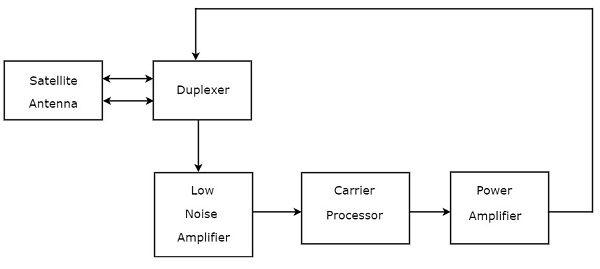
- Satellite Communication - Home
- Introduction
- Orbital Mechanics
- Kepler’s Laws
- Earth Orbit Satellites
- Look Angles & Orbital Perturbations
- Launching
- Subsystems
- AOC Subsystem
- TTCM Subsystem
- Power & Antenna Subsystems
- Transponders
- Earth Segment Subsystems
- Examples of Earth Stations
- Link Budget
- Multiple Access Techniques
- Satellite Services
- Global Positioning System
Satellite Communication - Transponders
The subsystem, which provides the connecting link between transmitting and receiving antennas of a satellite is known as Transponder. It is one of the most important subsystem of space segment subsystems.
Transponder performs the functions of both transmitter and receiver (Responder) in a satellite. Hence, the word Transponder is obtained by the combining few letters of two words, Transmitter (Trans) and Responder (ponder).
Block diagram of Transponder
Transponder performs mainly two functions. Those are amplifying the received input signal and translates the frequency of it. In general, different frequency values are chosen for both uplink and down link in order to avoid the interference between the transmitted and received signals.
The block diagram of transponder is shown in below figure.

We can easily understand the operation of Transponder from the block diagram itself. The function of each block is mentioned below.
Duplexer is a two-way microwave gate. It receives uplink signal from the satellite antenna and transmits downlink signal to the satellite antenna.
Low Noise Amplifier (LNA) amplifies the weak received signal.
Carrier Processor performs the frequency down conversion of received signal (uplink). This block determines the type of transponder.
Power Amplifier amplifies the power of frequency down converted signal (down link) to the required level.
Types of Transponders
Basically, there are two types of transponders. Those are Bent pipe transponders and Regenerative transponders.
Bent Pipe Transponders
Bent pipe transponder receives microwave frequency signal. It converts the frequency of input signal to RF frequency and then amplifies it.
Bent pipe transponder is also called as repeater and conventional transponder. It is suitable for both analog and digital signals.
Regenerative Transponders
Regenerative transponder performs the functions of Bent pipe transponder. i.e., frequency translation and amplification. In addition to these two functions, Regenerative transponder also performs the demodulation of RF carrier to baseband, regeneration of signals and modulation.
Regenerative transponder is also called as Processing transponder. It is suitable only for digital signals. The main advantages of Regenerative transponders are improvement in Signal to Noise Ratio (SNR) and have more flexibility in implementation.